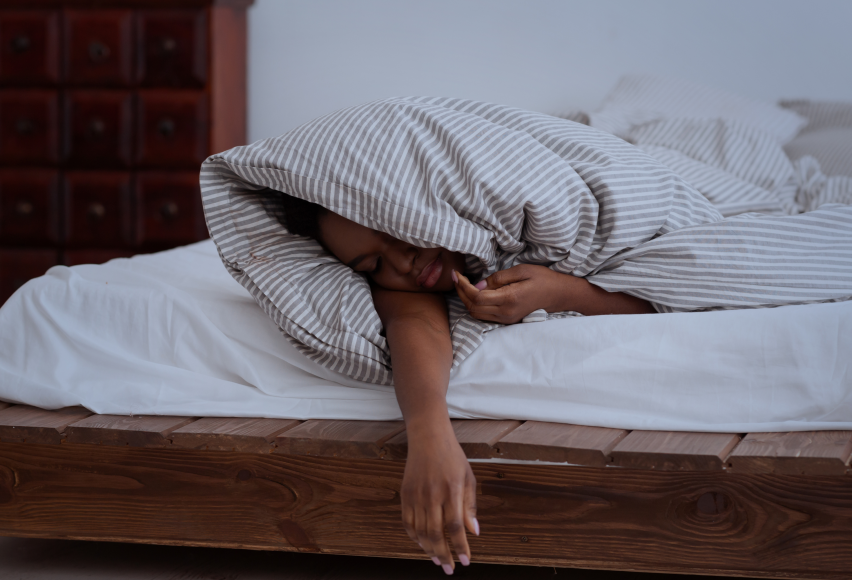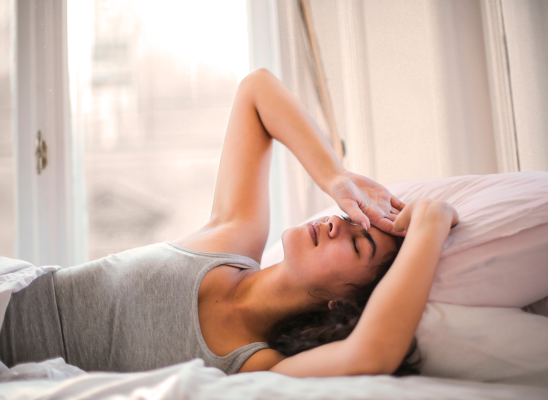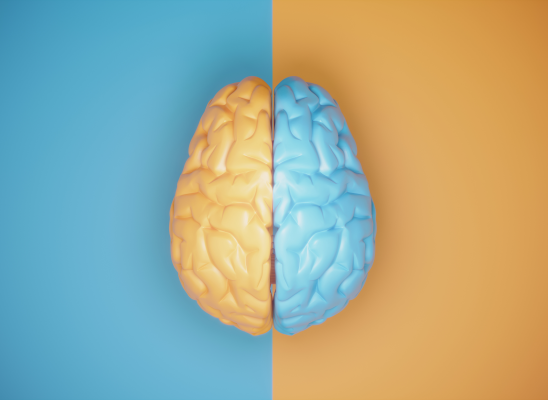
Online test
Find out the severity of your symptoms with this free online test
A good night’s sleep is something we all want and when we don’t get it, we feel it. For most people, adjusting their sleep routine is usually enough to get back on track. But for people with certain mental health disorders, getting a good night’s sleep is elusive and frustrating. And, not surprisingly, can make symptoms worse.
Sleep disturbance has been associated with a number of disorders including anxiety and mood disorders, schizophrenia, autism, and eating disorders. In fact, sleep disturbance, both insomnia and hypersomnia (sleeping too much), is one of the diagnostic criteria for major depressive disorder.
Sleep disturbances have also been identified as occurring with obsessive compulsive disorder. These disturbances have also been found to impact how the disorder is expressed, perpetuating a vicious cycle.
Research has highlighted the importance of getting good, restorative sleep. As a result, sleep has become recognized as an important part of healthy lifestyle management. Practicing good sleep hygiene, along with maintaining treatment, can help you manage your OCD and get a better night’s sleep.
Why Does Good Sleep Matter?
Good quality sleep is critical to brain health and function, as well as general health and well-being. When we sleep, our brain is busy clearing harmful toxins, consolidating memory, and preparing for the next day. The rest of the body is doing similar things, resting, repairing, and preparing for tomorrow’s activities. When the body doesn’t get adequate rest, it struggles to repair itself and operate at its best. Poor sleep can affect you physically and mentally too:
- Low energy
- Difficulty with memory
- Daytime drowsiness
- Mood changes (e.g., low mood, increased anxiety)
- Struggling to concentrate
- Increased irritability
An occasional night or two of poor sleep is not uncommon. However, over time, poor sleep can take its toll on your well-being and may even be indicative of a sleep disorder. Sleep disturbance isn’t the same for everyone. For some, sleeping too much is the problem. For others, it’s not being able to fall asleep or stay asleep. Having a co-occurring mental health disorder can make getting good, restorative sleep harder.
The Link Between OCD and Sleep Problems
Research has found that people with OCD are at higher risk for having sleep problems than people without a mental health disorder. Having a comorbid mental health disorder like depression or anxiety can further contribute to poor sleep quality when you have OCD. In fact, for people with OCD, the more severe the depressive or anxiety symptoms, the more impact there is on sleep quality.
OCD can make a good night’s sleep elusive for a number of reasons:
- Obsessive and intrusive thoughts don’t only happen during the day. They can continue, and even sometimes intensify during the quiet nighttime hours, making falling and staying asleep difficult.
- People with OCD tend to struggle with frequent awakening during the night, disrupting the natural sleep cycle.
- Certain compulsions (e.g., checking locks, turning off lights) may increase during the nighttime hours, creating a prolonged bedtime routine and delaying sleep. These urges may also occur during the night, contributing to nighttime awakening and disrupting sleep.
- Struggling with sleep can increase anxiety related to sleep, creating a vicious cycle that impedes restful sleep.
Common Sleep Challenges Faced by People with OCD
Nearly half of people with OCD experience difficulties with sleep. Common sleep problems include:
Delayed Sleep Phase Syndrome (DSPS)
DSPS is a circadian rhythm disorder where a person’s sleep is shifted later by two or more hours, causing them to fall asleep later than a common bedtime. Research has found that about 42% of people with OCD meet the criteria for DSPS. This can be especially problematic for those who engage in nighttime rituals or experience racing thoughts.
Sleep-Onset Insomnia
This is the type of insomnia that most people are familiar with - difficulty falling asleep. Falling asleep can be difficult for lots of reasons but for someone with OCD, it may be related to overthinking, performing compulsions, or a general sense of restlessness.
Sleep Maintenance Insomnia
This is the type of insomnia that involves difficulty staying asleep. You may wake up multiple times a night and find it hard to fall back asleep. This kind of awakening can happen for many reasons. For someone with OCD, it might be triggered by intrusive thoughts or anxiety.
Poor Sleep Quality
Sleep is more than just getting your “8 hours”. If you are able to sleep through the night but that sleep is of poor quality, it can leave you feeling tired and irritable the next day. Nightmares, restless sleep, and even things like room temperature, ambient light, or the texture of your blanket are a few of the many factors that can impact your sleep quality.
Getting A Better Night’s Sleep
Improving sleep hygiene can help you get a better night’s sleep and may even help you to better manage your OCD symptoms too. Sleep hygiene refers to the habits, behaviors and environmental factors that you can control to help improve your sleep quality. Here are several practical strategies you can try to improve your sleep hygiene:
Establish a Consistent Sleep Schedule
When it comes to sleep, consistency is key! A consistent bedtime schedule helps to regulate your body’s internal clock and promote more restful sleep. Try to go to bed and wake up at the same time each day, even on weekends. This routine helps your body to recognize when it’s time to wind down and prepare for sleep.
Create a Relaxing Bedtime Ritual
The key word here is relaxing. You want to avoid anything that is overly stimulating. Create a calming pre-bedtime routine to help you wind down and prepare for sleep. Find things that allow you to relax and let go of the stress of the day. Some relaxing activities might include reading a book, a warm bath, listening to soothing music, or practicing some deep breathing. Avoid using electronic devices, watching intense TV shows, or working late into the night. The blue light emitted from screens can interfere with the production of melatonin, the hormone that regulates sleep.
Manage Your Anxiety
Try to incorporate anxiety management and relaxation techniques such as mindfulness meditation, breathing exercises, or yoga into your daily routine. These practices can reduce anxiety levels and help your body enter a more relaxed state that can translate to more restful sleep.
Optimize Your Sleep Space
Create a space that encourages sleep. Keep your room cool, dark, and quiet. Consider using things like blackout curtains, white noise machines, or earplugs to minimize disruptions. Comfortable bedding can also make a huge difference. Let’s be honest, a lumpy mattress is not a sleep inducer. A new pillow, bedding made of breathable fabrics, or even a more comfy mattress can make getting your zzz’s a little easier.
Avoid Caffeine and Sugar Late in the Day
For some people, caffeine and sugar can be overstimulating and interfere with sleep. Try avoiding them in the late afternoon and evening to promote better sleep.
Another sleep disruptor is alcohol. It might help you to fall asleep but it’s also more likely to disrupt your sleep later in the night.
Professional Help
If sleep disturbances persist despite implementing these strategies, consider seeking professional help. OCD symptoms like intrusive thoughts or nighttime compulsions can make getting a good night’s sleep difficult. Treatment can help. A mental health professional who specializes in OCD can provide tailored interventions that might include some combination of:
Cognitive-Behavioral Therapy for Insomnia (CBT-I)
CBT-I is a structured, evidence-based therapy specifically designed to treat insomnia by addressing the thoughts and behaviors that interfere with sleep. Studies have found that it can be particularly effective for individuals with OCD who are experiencing sleep difficulties.
Medication
For some people, medication such as a selective serotonin reuptake inhibitor (SSRI) can help alleviate OCD symptoms which may in turn, help to foster more restful sleep. Other medications or sleep aids may also be beneficial in managing symptoms and sleep issues. This is a discussion to have with your healthcare provider in order to determine whether medication can help.
Exposure and Response Prevention (ERP) Therapy
ERP is a specialized form of CBT and is considered the “gold standard” in treating OCD. ERP is effective in treating OCD symptoms like intrusive thoughts or nighttime compulsions that may affect your sleep. Over time, learning to manage those symptoms can lead to a better night’s sleep.
Putting It All Together
Living with OCD can significantly impact sleep, but with the right strategies and professional support, it’s possible to improve sleep quality and overall well-being. If you’re in treatment for your OCD, it’s important to continue. Finding ways to manage your symptoms can help get you on the path to more restful, restorative sleep. In turn, getting better quality sleep may help your OCD symptoms too, leading to a healthier, more rested you.
If your OCD is interfering with your sleep, help is available. A trained therapist who specializes in treating OCD is a click away and can help you get on the path to healing and a better night’s sleep. And the good news is, you can see someone without ever having to leave home. Online therapy for OCD has proven to be effective in numerous studies. Ready to see how therapy can help? Connect with one of our therapists today.
References
1. Baglioni, C., Nanovska, S., Regen, W., Spiegelhalder, K., Feige, B., Nissen, C., Reynolds, C. F., & Riemann, D. (2016). Sleep and mental disorders: A meta-analysis of polysomnographic research. Psychological bulletin, 142(9), 969–990. https://pubmed.ncbi.nlm.nih.gov/27416139/
2. Substance Abuse and Mental Health Services Administration. DSM-5 Changes: Implications for Child Serious Emotional Disturbance [Internet]. Rockville (MD): Substance Abuse and Mental Health Services Administration (US); 2016 Jun. Table 9, DSM-IV to DSM-5 Major Depressive Episode/Disorder Comparison. Available from: https://www.ncbi.nlm.nih.gov/books/NBK519712/table/ch3.t5/
3. Good sleep for good health. (2022, July 15). NIH News in Health. https://newsinhealth.nih.gov/2021/04/good-sleep-good-health
4. Paterson, J. L., Reynolds, A. C., Ferguson, S. A., & Dawson, D. (2013). Sleep and obsessive-compulsive disorder (OCD). Sleep medicine reviews, 17(6), 465–474. https://pubmed.ncbi.nlm.nih.gov/23499210/
5. Segalàs, C., Labad, J., Salvat-Pujol, N. et al. (2021). Sleep disturbances in obsessive-compulsive disorder: influence of depression symptoms and trait anxiety. BMC Psychiatry 21, 42. https://bmcpsychiatry.biomedcentral.com/articles/10.1186/s12888-021-03038-z
6. Suni, E. (2023, September 1). Mastering sleep hygiene: Your path to quality sleep. Sleep Foundation. https://www.sleepfoundation.org/sleep-hygiene
7. Smith, M. T., Huang, M. I., & Manber, R. (2005). Cognitive behavior therapy for chronic insomnia occurring within the context of medical and psychiatric disorders. Clinical Psychology Review, 25(5), 559-592. https://www.sciencedirect.com/science/article/abs/pii/S0272735805000309
8. Kellner M. (2010). Drug treatment of obsessive-compulsive disorder. Dialogues in clinical neuroscience, 12(2), 187–197. https://pmc.ncbi.nlm.nih.gov/articles/PMC3181958/
9. Hezel, D. M., & Simpson, H. B. (2019). Exposure and response prevention for obsessive-compulsive disorder: A review and new directions. Indian journal of psychiatry, 61(Suppl 1), S85–S92. https://pmc.ncbi.nlm.nih.gov/articles/PMC6343408/
Online test
Find out the severity of your symptoms with this free online test
Start your journey with StopOCD
Take control of your life and find freedom from OCD through professional therapy and evidence-based cognitive behavioral techniques.
Start Now



